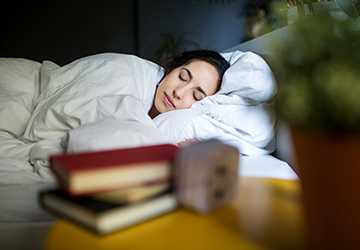Do you ever feel like you're dragging yourself through the day, exhausted, no matter how much coffee you drink? Or do you lie awake at night, insomnia keeping you from much-needed rest?
An estimated 50-70 million US adults have a sleep disorder, hindering daily function. Your bedtime routine and sleep environment may negatively affect your sleep and well-being.

In this blog post, we'll talk about the impact of sleep on your health and five tips for better sleep hygiene. You can set yourself up for more restful nights by changing your daily routines.
Sleep's Impact: 5 Tips for Better Sleep Hygiene
Sleep allows both the body and mind to recharge their batteries. Without adequate restful sleep, nearly every bodily system is affected.
The human body heals and regulates critical functions, primarily during sleep cycles. Skimping on sleep disrupts essential rejuvenation for cells, organs, muscles and tissue.
From obesity to heart disease, diabetes and stroke, poor sleep is linked to medical conditions. Even cognition, mood, and mental health depend upon routine quality sleep.
Chronic sleep loss degrades your immune system, quickens ageing, and raises mortality risk.
1. Maintain a Consistent Sleeping Schedule
When you maintain a sleep-wake cycle by falling asleep and waking up regularly, you train your body's internal clock for better sleep. This internal clock governs the sleep-wake cycle by releasing hormones that make you sleepy/alert.
When you irregularly shift your bedtime, you scramble your circadian rhythm signals; this makes falling asleep quickly at night more difficult.
Creating sleeping and waking rituals reinforces consistent timing. Following a routine reaffirms your body’s natural sleep cues. Whether you set alarm clocks, take evening showers, or dim lights at a set time - repeat what conditions tell your body it's time for shuteye!
2. Limit Blue Light Exposure
Blue wavelength light emitted from phones, TVs, computers, and other electronics inhibits melatonin production. Melatonin is a critical sleep-inducing hormone. Overexposure to blue light close to bedtime tricks your brain into feeling awake when you want to wind down.
Avoid bright LED screens during the 1-2 hours before bed for better nighttime drowsiness. Switch devices to low brightness or orange tint night modes.
Read a book or listen to music instead of screens right before bed. These adjustments reduce blue light interference, allowing natural melatonin to kick in.
3. Engage in a Soothing Nightly Routine
As consistent sleep timing assists your circadian rhythm, engaging in your favourite relaxing activities tells your body and mind to prepare for sleep. Unwinding pre-bed rituals wean your system from stimulating daytime stress/demands.
Sipping herbal tea, taking a warm bath, practising yoga stretches, journaling thoughts - find what personally unwinds you. Meditation relieves racing thoughts while reading educates yet distracts.
Gentle music or ASMR soothes jangled nerves. Set aside 30-60 minutes before bed to relax without deadlines looming. Soon, habit-forming activities innately induce soothing sensations, so you naturally grow sleepy.
4. Optimize Your Bedroom Environment
Your sleep sanctuary impacts rest quality from temperature to sounds, comfort to aesthetics. Make simple tweaks to accommodate slumber instead of sabotaging it. Identify aspects hindering you from quickly drifting off and adjust them accordingly.
Ideal sleeping temperature falls around 65°F (18°C). Hot rooms disrupt sleep, yet freezing environments impede rest with cold extremities. Use adjustable thermostats and breathable bedding that release heat but retain cosiness.
Ensure total darkness with blackout curtains. Eliminate disruptive noises using earplugs or white noise machines. Invest in supportive mattresses/pillows cushioning pressure points. Surround yourself with serene, inviting sleep space vibes.
5. Curtail Sleep-Disrupting Substances
Consuming stimulating, sleep-disrupting substances too close to bedtime hinders quality shuteye. Caffeine, large protein-heavy meals, sugary snacks, alcohol and nicotine negatively impact sleep cycles for hours.

Instead of relying on substances to forcibly knock you out, allow natural relaxation pathways to trigger drowsiness. Refrain from food/drinks with stimulating ingredients for at least 3 hours pre-bedtime. Curb drinking alcohol to 1-2 servings max, only with dinner.
Swap sweets for complex carbs and protein earlier at night. Stop metabolizing nicotine at least 90 minutes before attempting to sleep. Buffer enough time between consumption and sleep to allow your body to process and digest.
Conclusion
Getting adequate, healthy, restful sleep is essential for your health, mood, and overall well-being. By improving your sleep hygiene with these five tips, you can improve your sleep quality.
Start with small changes to set positive lifelong sleep habits. With better sleep, you'll feel refreshed, energetic and ready to tackle each day.




